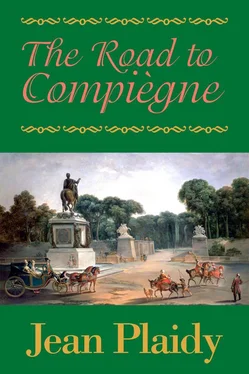The problem which confronted him – either to deny his faith or give up his profession – had so depressed him that he developed unwise drinking habits in order temporarily to relieve his depression.
One of his friends, a certain Lavaysse, was also a member of a Protestant family but, because he had been brought up by Jesuits, he had not found any difficulty in following the career he wanted. Lavaysse had belonged to the Navy in which he had excelled; and a rich relation had left him a plantation in Saint Domingo to which he was about to go.
Before leaving he called at the Calas house to say his farewells. He did not exactly boast but it was natural that the depressed Marc Antoine should compare his own career with that of the successful Lavaysse, and he suddenly left the company, went up to his room and hanged himself.
When his body was discovered, the family was horrified, not only at the loss of their son, but because it was the Catholic custom to take the body of a Protestant suicide – or suspected suicide – and drag it naked on a hurdle through the town. This was considered to be a stigma which would be attached to the rest of the family for years after the event.
The lamentations of the Calas family, when they cut down the body of Marc Antoine, attracted the attention of neighbours, who came into the house to see what was wrong.
‘He has killed himself!’ cried one.
Monsieur Calas, visualising the naked body of his son being subjected to humiliation, cried out: ‘No, no! It was not suicide.’
‘So . . . it was murder!’
One of the neighbours went into the streets and shouted: ‘Citizens, come quickly! Here is a Protestant family who have murdered their son.’
Soon there was a crowd outside the house. They stormed into it, took the body of Marc Antoine, stripped it and dragged it through the streets. They seized every member of the Calas family and forcing them to march through the streets behind the body, they cried: ‘See! Here are Protestants who have strangled their own son.’
The family was thrust into prison, and the Catholic priests concocted a case against them. Marc Antoine had declared his intention of becoming a Catholic, they said, and because of this his family had strangled him. Special services were held to eulogise Marc Antoine, for the priests saw an opportunity of inciting the citizens of Toulouse against the Protestants, and such opportunities were never ignored.
They declared that the Protestants held secret tribunals in which they decided to murder all of their number who expressed the wish to be converted to Catholicism. The people of Toulouse were called upon to show their love of the true faith, which meant that they must demand persecution of the Calas family.
The case of Calas might have been merely another which chained France to the dark ages of intolerance, but for the so-called atheist of Ferney who poured out his scorn for his fellow countrymen. ‘The judgement of this Protestant family,’ declared Voltaire, ‘is all the more Christian in that it is incapable of proof.’
Calas, a man of sixty-four, was broken on the wheel. In the midst of his agony he was asked to confess, but he only declared his innocence and prayed for the forgiveness of his tormentors.
Voltaire, from Ferney on the borders of Switzerland – into which country he could escape should the French authorities decide to regard his outspokenness as treason – followed the case with great attention; he wrote to Madame Calas and asked her if she would swear to him that her husband was innocent.
Having received her reply in the affirmative, Voltaire then brought his genius into play. He was going to have the verdict against Calas reversed; not only that, he was going to put an end to religious persecution in France for all time.
He began by writing letters to Saint-Florentin, Duc de la Vrillière, who was known as the ‘Minister of the lettres de cachet ’ because he allowed his mistress to sell them at fifty louis each. Artfully Voltaire suggested that Saint-Florentin must feel as disturbed by this affair as he was. Saint-Florentin, thus brought into the limelight, while protesting that the affaire Calas was a matter for the Justiciary, was made uneasy because he felt that Voltaire was shining a light on the prisons which were full of those who, because some person of influence had wished them out of the way, had received their lettres de cachet .
The campaign was fierce and long. That was what Voltaire intended it should be. The wits and savants took it up; the injustice of the punishment meted out to Monsieur Calas was discussed among the writers and philosophers.
Choiseul watched not without pleasure. He was on the side of Voltaire, eager as ever to see the Church in a subordinate position.
The force of public opinion stirred up by the fiery writings of Voltaire brought about the release from prison of Madame Calas who immediately left Toulouse to find refuge at Ferney.
This took place immediately before the expulsion of the Jesuits; and Choiseul, eager to score a trick against Saint-Florentin, released a certain young man from service in the galleys. This was Fabre, whose father had been sentenced to serve there. Fabre had made possible his father’s escape by taking his place.
When this was discovered there had been a certain outcry and a demand that such a saintly young man should be given his liberty. Saint-Florentin had retorted that Fabre had defied the law and, since he had placed himself in a position to take over his father’s service, he should do so.
Choiseul now stepped in. He had an eye for public approval. The Calas case had aroused deep feeling throughout France and he felt that a large public opinion was in favour of tolerance.
He therefore ordered that Fabre be given his freedom. Saint-Florentin was furious, but he could do nothing against the all-powerful Choiseul.
Meanwhile Voltaire’s pamphlets continued to be received in Paris, and when he heard that the Toulouse Parlement was planning to re-arrest Madame Calas he suggested she go to Paris, which was more liberal-minded than any city in France, and there plead her cause.
While Madame Calas was travelling to Paris, Saint-Florentin made a great effort to discredit Voltaire and with him his ally Choiseul.
He employed a talented writer, Fréron, to write an article, which was supposed to have appeared in an English paper, attacking the King.
Choiseul’s spies however had brought him information that this was about to be launched in Paris; whereupon Voltaire’s venomous pen produced such attacks on Fréron as to make that man quiver with rage and terror, and Voltaire had little difficulty in proving the article to be a forgery.
The Toulouse Parlement meanwhile had busied itself to bring another case against the Protestants; and when a young girl was found dead in a well, her father, a Monsieur Sirven who was a Protestant, was accused of murdering her because, the Parlement declared, it was a custom of Protestants to murder their children.
However, Voltaire’s invective and the knowledge that the all-powerful Choiseul was supporting him, encouraged others to be bold.
It was proved that the only witness in the case was a small child, who had been alternately bribed and threatened to say that she had seen Monsieur Sirven throw his daughter into the well. The truth was discovered to be that the child had been taken from her parents and put into a nunnery to learn to become a Catholic. The child had fretted for her parents and home, and because of this had been ill-treated. When she showed signs of madness she was sent home where, fearful that she should be taken back to the nunnery, she killed herself by jumping down the well.
Читать дальше








